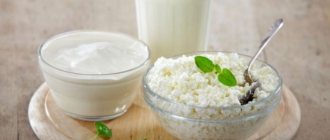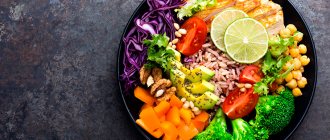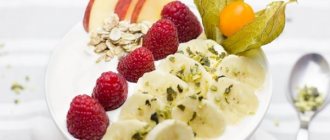Vegetarianism as a way of eating and even a way of life is gaining more and more fans today. It no longer surprises anyone if in a group at the table someone abstains from meat or dairy products, or if one of your guests prefers salad to steak. We are increasingly seeing vegan-friendly dishes on the menus of cafes and restaurants; store shelves are rushing to offer a wide selection of products and goods that do not contain animal ingredients.
However, while vegetarianism has long been a trend in the West, in our country people have very vague ideas about what exactly a vegetarian diet consists of, and treat this food system with suspicion and distrust. But this is one of the most ancient types of food, which is many thousands of years old. Such ignorance gives rise to a lot of myths that spread across the Internet and continue to mislead people about the benefits and harms of vegetarianism.
We all periodically come across halivars online between “meat-eaters” and vegetarians, accusing each other of all mortal sins. If you are a beginner vegetarian or are just about to try this type of diet, these online showdowns will confuse you even more. I often see that many, having become vegetarians, go to great lengths without fully thinking through their daily menu. But such frivolity can undermine a person’s health – sometimes irreversibly. Therefore, it is important to understand the following questions: what does vegetarianism include and what types does it come in? How to switch to a vegetarian diet correctly? How to get all the necessary substances with such a diet (and not die of hunger)? And the most interesting thing: WHERE DO VEGETARIANS GET PROTEIN? Let's figure it out.
Types of vegetarianism
Vegetarianism is a food system in which all products of animal origin (meat, fish, chicken, seafood, etc.) are excluded from consumption. A similar practice of conscious dietary restriction can be found in the history of many peoples, but the term “vegetarianism” itself was officially assigned to this movement on September 30, 1847, when the Vegetarian Society of the United Kingdom was founded in Ramsgate in England. It still exists today, famous members of this Society are Mahatma Gandhi, J. Bernard Shaw, Paul, Linda and Stella McCartney. To name a person who practices this type of nutrition, the English term “vegetarian” was chosen, which, according to some sources, comes from the Latin “vegetus” - “vigorous”, “fresh”, “alive”, and according to others - from the English word vegetable (vegetable).
Vegetarianism can be strict - then it is called veganism or veganism . With this type of diet, absolutely everything that contains animal components is excluded: in addition to meat, poultry, fish and seafood, eggs, all dairy products and honey are not consumed. Veganism is more than just nutrition, it is a way of life, the main principle of which is the absence of any exploitation of animals for the sake of humans (even if the animal is not killed). Therefore, vegans do not wear leather, wool and fur products and shoes made from these materials, and do not consume products tested on animals, as well as substances such as glycerin, gelatin, etc.
Other types of vegetarianism are much less ascetic: ovo-, lacto-lacto-ovo-vegetarianism. With lacto-ovo vegetarianism , eggs and dairy products remain in the diet; Ovo-vegetarianism excludes dairy products, and lacto-vegetarianism , accordingly, excludes eggs. In all three systems, honey is usually used. There is also pescatarianism , when fish and seafood are left in the diet, and only warm-blooded meat is limited.
There are several more extreme options for veganism: raw food diet and fruitarianism , which we will not consider in this article.
I will only say that I cannot call these types of nutrition complete and healthy and I advise you to treat them very carefully, as they can cause serious harm to the body.
Vegetarian menu: how to create?
To minimize all the risks of giving up animal food, a vegetarian’s daily menu should be as balanced and varied as possible. For beginners, it is advisable to schedule meals for every day and purchase the necessary products. Preparing a vegetarian menu for the week is easy. To do this, every day your diet should include vegetables, fruits, grains, nuts, as well as dairy products and eggs, if the type of vegetarianism allows you to consume these products.
It is important to consider that you can only eat the freshest fruits and vegetables - then the body will receive the maximum amount of nutrients. The following is a more detailed description of what vegetarians eat throughout the day and how to properly formulate a diet.
- Breakfast - you should start the day with oatmeal, buckwheat or barley porridge. You should also eat some fruit in the morning. You can drink green tea or coffee.
- Lunch – it is recommended to consume two dishes at the main meal. The first is a liquid dish, for example, vegetable or mushroom soup, borscht. For the second course, you can prepare a green salad or a salad of cabbage, apples, radishes, etc. For lunch, you can eat a small vegetarian dessert - for example, pastries.
- Afternoon snack – at this time you should eat a fruit salad. For those who eat dairy dishes, you can opt for yogurt, kefir or fermented baked milk.
- Dinner - in the evening you can prepare stewed potatoes and cabbage or cucumber salad. A good option would be milk soup.
This is only an approximate “schedule” of nutrition, which can be varied by preparing a wide variety of dishes. A list of foods that vegetarians consume will help you do this.
Reasons for transition and statistics
People become vegetarians for various reasons, the main ones being:
- ethical (the principle of non-violence (Sanskrit “ahimsa”), out of compassion for other living beings);
- religious (some religions, for example, Hinduism, prohibit the consumption of meat; also, in many religions there are fasts (for example, in Christianity) - temporary refusal of certain foods);
— environmental (there is evidence that about 30% of greenhouse gases on the planet are formed due to the activities of livestock farms and the infrastructure that serves them; in addition, tropical forests, the “lungs” of our planet, are subjected to severe deforestation, and wastewater from slaughterhouses pollutes rivers and soil);
- economic (approximately 40% of all grown grain goes to feed livestock bred for slaughter, and reducing this figure by at least half can solve the problem of hunger on earth; also, for the purposes of livestock farming, a huge amount of water is spent - one of the most valuable resources on the planet );
- medical (a vegetarian diet can reduce the risk of cardiovascular diseases, some types of cancer, gastrointestinal diseases, etc.).
Vegetarianism is most common in India (about 84% of the population) and Taiwan (14%). From 5 to 10% of vegetarians are found in Brazil, Israel, Italy, Germany, Great Britain, 9% in Sweden, 6% in the Netherlands and Norway, 4% in the USA, less than 5% in Spain, France, Australia, New Zealand. Zealand, Poland and the Czech Republic. In Russia in 2013, there were about 4% of convinced vegetarians (according to a survey conducted by the Superjob portal), and 55% of respondents stated their approval of the position of vegetarianism.
There are certain difficulties that people face when switching to a vegetarian diet. Let's look at them in more detail.
What do vegetarians suffer from?
The whole truth about this system should also include information about those diseases, the risk of which increases in the absence of animal food in the diet. As noted above, due to the refusal of animal products, the body experiences a lack of a number of important substances. The result of this may be the development of serious diseases and pathological conditions:
- Iron deficiency and other types of anemia are a condition associated with a lack of meat in the diet. In this condition, weakness, pallor, shortness of breath , heart palpitations, etc. are troubling.
- B12 and folate deficiency anemia – due to such deficiency, neurological disorders can develop.
- Urolithiasis and cholelithiasis - vegans develop such diseases more often. When refusing animal food, the flow of bile , which leads to the formation of sand and stones. In addition, some plant foods (spinach, rhubarb, sorrel) provoke the accumulation of oxalic acid salts in the urine. These later form into stones. Stone formation is also associated with a lack of vitamin D in the body.
- Digestive disorders - in the process of switching to a vegetarian menu, people are often bothered by diarrhea, constipation, flatulence , cramps, and bloating.
- Deficiency conditions - if the body lacks certain minerals, this can lead to the development of brain diseases. According to some scientists, a lack of folic acid and vitamins B6 , B12 activates brain aging and provokes the development of Parkinson's and Alzheimer's diseases. And a lack of vitamin D leads to the development of osteoporosis .
- Hormonal imbalance – scientific research has confirmed that if people do not eat animal products, this can lead to disruptions in the balance of thyroid hormones. Therefore, vegetarians are more likely to experience endocrine disorders.
- Deterioration of dental health – when consuming large amounts of acidic vegetables and fruits, tooth enamel is destroyed, which increases the risk of caries and other dental diseases.
Therefore, you need to be conscious about vegetarianism and try to diversify your diet as much as possible.
In this context, there is still debate about who has a longer life expectancy - those who eat meat or those who refuse it. In some studies, scientists note that the average life expectancy is about three and a half years higher for those who give up meat. Among those who do not consume meat, long-livers are quite common. However, there are many studies on this matter, some of which, on the contrary, indicate that meat eaters live longer. After reading an abstract or report on this matter, you can find many arguments confirming this or that opinion. But in general the issue is still quite ambiguous.
Moreover, there are many myths about this current. For example, some sources say that those who do not eat animal foods do not get cancer. However, this statement does not stand up to criticism, since numerous studies show that vegetarians are slightly less likely to suffer from certain types of cancer.
Protein deficiency
The very first question a newly-made vegetarian hears is: “Where do you get your protein?” With a standard diet, we get approximately 38-33% protein per day from meat and meat products. With a vegetarian diet, these percentages must be properly replenished from plant and/or dairy foods and eggs. Despite the fact that there is a lot of protein in cereals and legumes, it is not easy for our body to absorb. Below I will provide a table of the content and digestibility of protein from various foods.
Pay attention to the following columns:
— the amount of protein in grams per 100 g of product (this way you can estimate how much protein you will eat from a serving of a protein product);
- digestibility in % (shows how efficiently the average person digests this or that type of protein - here you need to make allowances for your own body, because we are all unique);
- biological value (BC - the percentage of utilization of protein entering the body. Whey protein and eggs are utilized by the body by 100%, milk - by 93%, rice by 86%, casein, fish and beef - by 75%, corn - by 72%, grain gluten – by 44%);
- protein absorption coefficient PDCAAS (or also called adjusted amino acid score. This indicator includes three main parameters: the content of essential amino acids, protein digestibility and the ability to supply essential amino acids in the quantity required for a person. If it is equal to 1, then this is the “best " according to these three indicators protein).
We see that the protein with the highest absorption rate is eggs, egg powder, whey and dairy products (milk, kefir, cottage cheese, cheese). If we exclude powdered eggs and whey from the list, which we don’t eat in normal life, then the most effective foods for protein will be cottage cheese, cheese and eggs. Of the plant products, the most valuable in terms of protein intake and processing by the body will be soybeans (the absolute leader), beans, peas, buckwheat, rye and corn. Therefore, it is better to focus on these foods in your diet.
Thus, the protein diet for a girl weighing 60 kg will be something like this:
- 2 eggs (approximately 90 g serving = 11.43 g protein)
- glass of kefir (approximately 200 g = 5.6 g protein)
- 150 g buckwheat (= 18.9 g protein)
- 2 slices rye-wheat whole grain bread (about 50 g = 5.45 g protein)
- 100 g cottage cheese (approximately 17 g protein)
One of the difficulties of a purely plant-based diet (veganism) is amino acid imbalance . The fact is that plant proteins have an incomplete composition of amino acids, which significantly reduces their effectiveness. Why it is important to replenish the entire range of amino acids in your diet, I have already written here . To even out the amino acid composition, it is recommended to use several protein sources in each main meal and combine them with each other as follows:
- rice with beans or sesame seeds;
- wheat with legumes, peanuts, sesame and soy;
- legumes with corn or wheat;
- soy with rice and wheat, wheat and sesame, or peanuts and sesame;
- peanuts with sunflower seeds.
Points for and against
Considering how many vegetarians there are in the world, and according to statistics there are more than a billion of them on the planet, we can safely conclude that this movement is becoming more and more popular every year. Therefore, in order to immediately debunk the myths about this type of nutrition and lifestyle, it is worth listing all the pros and cons of vegetarianism.
Arguments in favor
The following arguments can be made to convince a person to give up eating meat and follow the basics of vegetarianism:
- Plant foods contain fewer carcinogens . This has been proven in numerous studies. Those who are accustomed to regularly eating fried meat dishes are more likely to suffer from various diseases, and they are more likely to develop cancer of the digestive organs.
- This diet allows you to better control your weight. A vegetarian diet as a way to lose weight is described in many sources. Indeed, when consuming exclusively plant foods, it is easier to lose weight, since such a diet is generally lower in calories. However, not all vegetarians are thin. And even among sumo wrestlers, vegetarianism is common. Therefore, such nutrition can be called lighter. But the answer to the question of whether there are fat vegetarians is still positive.
- Plant foods are an effective prevention of the development of vascular and heart diseases. This thesis is motivated by the fact that in countries where a meat diet predominates in the diet, people are much more likely to suffer from diabetes , hypertension, and suffer from heart attacks . Also, people with a plant-based diet are less likely to experience such a terrible disease as atherosclerosis , because vegetarians have lower blood cholesterol levels.
- A vegetarian diet contains more vitamins. If the plant-milk diet is varied and balanced, then a person will be able to get all the minerals and vitamins .
- When following this diet plan, a person becomes more energetic, feels better and more cheerful. In addition, his mood improves and attacks of irritability are less frequent.
- There is an opinion that adherents of vegetarianism are less likely to suffer from colds.
Arguments against
There are several compelling arguments against following a vegetarian lifestyle:
- Considering what vegetarians eat, it should be understood that their diet lacks those minerals and vitamins that are present exclusively in meat products. We are talking primarily about iron and vitamin B12 . Even if soy and legumes are present in the diet instead of meat, they still do not satisfy all the body’s needs. As a result, in more than half of the cases, vegetarians experience anemia and iron deficiency, which leads to hair loss and brittle nails, decreased performance and loss of strength. In women, the monthly cycle may be disrupted and intestinal problems may appear.
- Foods of plant origin contain little iodine, calcium, and vitamin D. A deficiency of these substances can result in problems with the thyroid gland, problems with teeth and bones. This condition is especially dangerous for older people.
- Since vegetarian food contains a lot of plant fiber, its constant consumption leads to impaired protein absorption. This condition causes the development of muscular dystrophy, deterioration of immunity , increased risk of tuberculosis , etc.
- Pregnant women and mothers nursing babies cannot get enough of the substances they need from such food, in particular, protein, which the child needs for normal development.
- Many sources note that children under 15 years of age should not practice exclusively plant-based nutrition. Meat should be introduced into a child's complementary feeding in a timely manner to avoid the development of anemia, dystrophy, and retardation in mental and physical development. In addition, later, when the baby goes to kindergarten or attends a children's camp, he will have to give up regular food and, probably, be malnourished.
- Another disadvantage is that vegetarian food is not always available. In many cafes, shops, restaurants, hotels, it is very difficult for vegans or vegetarians to purchase food that meets all the principles of their nutritional system. Therefore, meals have to be planned in a special way.
- It is also unlikely that you will be able to save money with such food. Despite the fact that there is no need to buy meat, products that allow you to diversify your diet are quite expensive. Mushrooms, high-quality dairy products, and fruits are not a cheap pleasure.
Vitamin B12 deficiency
Vitamin B12 (cyanocobalamin) is not synthesized by animals or higher plants; only microorganisms are capable of producing it (for example, the microflora of our intestines). But it successfully accumulates in organs such as the liver. Vitamin B12 reserves will last a person for 3-4 years. However, its shortage may cost us dearly. Just look at how many important processes it is involved in!
Cyanocobalamin is involved in the production of leukocytes, hemoglobin and blood cells. In its absence, anemia develops. Also, it is involved in the processes of immunity formation (for example, in people with HIV, with a lack of B12, various infectious diseases develop much faster, which in turn brings AIDS closer). It is involved in the formation of the myelin sheath on nerve fibers, activating the processes of DNA and RNA synthesis, and helps carotene become retinol (vitamin A), suitable for absorption by our body. In addition, vitamin B12 is involved in the process of protein breakdown, the metabolism of proteins, fats and carbohydrates in a number of reactions, ensuring normal brain function, supporting the respiratory system and many other important functions.
As already noted, plant foods do not contain vitamin B12 in a form accessible to the human body, and its main sources are the organs and meat of animals and fish that have accumulated this vitamin during life. However, it can also be obtained from eggs and dairy products, so ovo- and dairy-vegetarians may not have to worry too much about a deficiency as long as they eat enough of these foods. And this is at least 3 mcg/day. A chicken egg per 100 g contains approximately 0.5 mcg of vitamin B12, sour cream - 0.4 mcg, Dutch cheese - 1.4 mcg. Filling the need is not easy, but it is still possible. However, if you are a vegan, you need to take vitamin complexes with sufficient cyanocobalamin content, otherwise you will not compensate for its deficiency. And what this entails – I think it’s now extremely clear.
What do vegetarians eat: food list
"Poor" vegetarians don't even know what to eat











